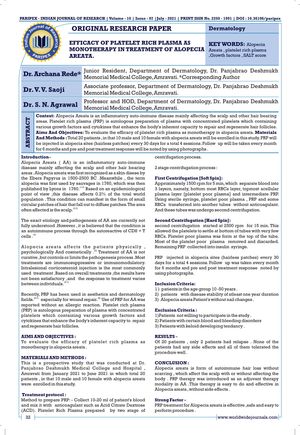 3 citations
,
January 2016 in “International Journal of Research in Medical Sciences”
3 citations
,
January 2016 in “International Journal of Research in Medical Sciences” Using both minoxidil and platelet-rich plasma therapy together is more effective for hair growth in women than using minoxidil alone.
 15 citations
,
November 2015 in “Journal of Dermatology and Dermatologic Surgery”
15 citations
,
November 2015 in “Journal of Dermatology and Dermatologic Surgery” Mixing platelet-rich plasma with triamcinolone acetonide can potentially improve hair regrowth in alopecia areata patients.
 79 citations
,
October 2015 in “Journal of Dermatological Treatment”
79 citations
,
October 2015 in “Journal of Dermatological Treatment” Platelet-rich plasma may have some benefits in dermatology, but there's not enough evidence to widely recommend its use.
 214 citations
,
September 2015 in “Stem Cells Translational Medicine”
214 citations
,
September 2015 in “Stem Cells Translational Medicine” Platelet-rich plasma injections significantly improved hair regrowth and thickness in patients with hair loss.
 22 citations
,
January 2015 in “Actas dermo-sifiliográficas/Actas dermo-sifiliográficas”
22 citations
,
January 2015 in “Actas dermo-sifiliográficas/Actas dermo-sifiliográficas” Platelet-rich plasma might help with skin aging, ulcers, and hair loss, but more research is needed to prove its effectiveness and safety.
 58 citations
,
January 2015 in “International Journal of Trichology”
58 citations
,
January 2015 in “International Journal of Trichology” Platelet-rich plasma, which carries growth factors, could be a promising treatment for non-scarring hair loss, promoting hair growth and density with no major side effects.
 74 citations
,
January 2015 in “Asian Journal of Transfusion Science”
74 citations
,
January 2015 in “Asian Journal of Transfusion Science” Platelet-rich plasma (PRP) injections can effectively increase hair density and thickness in people with androgenic alopecia, without major side effects.
 183 citations
,
January 2014 in “BioMed Research International”
183 citations
,
January 2014 in “BioMed Research International” AA-PRP injections effectively increase hair count and thickness for male pattern hair loss.
110 citations
,
December 2013 in “The journal of investigative dermatology. Symposium proceedings/The Journal of investigative dermatology symposium proceedings” Alopecia areata is a genetic and immune-related hair loss condition that is often associated with other autoimmune diseases and does not typically cause permanent damage to hair follicles.
 29 citations
,
June 2013 in “Journal of the Saudi Society of Dermatology & Dermatologic Surgery”
29 citations
,
June 2013 in “Journal of the Saudi Society of Dermatology & Dermatologic Surgery” Alopecia areata is an autoimmune hair loss condition treated with corticosteroids, and histologic confirmation is the best diagnosis method.
 23 citations
,
January 2013 in “Indian Journal of Dermatology, Venereology and Leprology”
23 citations
,
January 2013 in “Indian Journal of Dermatology, Venereology and Leprology” FPHL causes hair loss in women due to genetics and hormones; minoxidil and anti-androgens are treatments, and early intervention is advised.
 270 citations
,
March 2012 in “Dermatologic Surgery”
270 citations
,
March 2012 in “Dermatologic Surgery” Platelet-rich plasma can potentially promote hair growth by stimulating cell growth and increasing certain proteins.
53 citations
,
May 2011 in “Dermatologic therapy” Alopecia areata is a skin condition causing hair loss, and its exact cause is unknown, but it may involve biological mechanisms.















